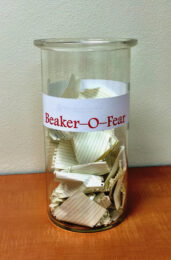Tamping down test anxiety
Science faculty and the Learning Assistance Center (LAC) at Wake Forest University are collaborating this fall to help first-year students deal with test anxiety through a three-part workshop, “How to prevent a panic attack on your first college science exam.”
First-year student Alexus Moyer from Eden, N.C., has been on campus less than a month, and she already has her sights set on academic success. She was one of more than 100 students in attendance at the first session held Sept. 8 that focused on exam preparation.
“I get very anxious, even with homework and grades in general,” said Moyer.
Michael Shuman, interim director, and Shelly Cardi, staff psychologist, of LAC, as well as Pat Lord, director of Health Professions Program and associate teaching professor of biology, and David Wren, assistant teaching professor and director of the Chemistry Center, are facilitating the workshops.
Wren described the LAC as the “emergency department” for students where triage takes place to help deal with test anxiety. He and his colleagues believe a pre-emptive strike like these workshops will be more effective for students in the long run.

“All of us have had experience with students not knowing how to study, how to prepare, how to take the exam – and not panic – or how to analyze how they performed,” said Lord. “We’ve got some amazing things planned to help our students learn and do their best and we guarantee they will learn at least one technique that will help them improve their study skills.”
The first workshop focused on preparing for the exam. Shuman talked with students about the science of learning and offered active learning strategies like taking pre-tests to increase retention. “Practice makes perfect, but practicing and mixing things up is more effective and leads to better mastery, longer retention and more versatility, but it comes with a price – it requires more effort,” he said.
Cardi told students that a little pressure isn’t a bad thing and can even help them achieve optimal performance. “It’s good to put pressure on yourself because it helps you achieve good results, but too much anxiety isn’t a good thing and doesn’t help,” she said. “We get flooded with anxiety which affects our higher order thinking ability and then you shift into your primitive brain that simply wants to run away so you’re either positioned to fight, freeze or flee.”
The second workshop on Sept. 15 will focus on taking the exam and tips to prepare while the final workshop on Sept. 29 will help students analyze their performance and what to do about their grade, especially if they don’t perform as well as they hoped. During that session, upper class students are coming to share their experiences about being nervous and panicking. They will also discuss their failures and what they did to overcome that initial failure.
“I know at a lot of schools people talk about certain courses as ‘weed out’ courses,” Lord said. “I don’t think any of us faculty think that here at Wake – we want every student to be successful.”
Categories: Campus Life, Experiential Learning, Happening at Wake, Research & Discovery, University Announcements
Media Contact
Wake Forest News
media@wfu.edu
336.758.5237



